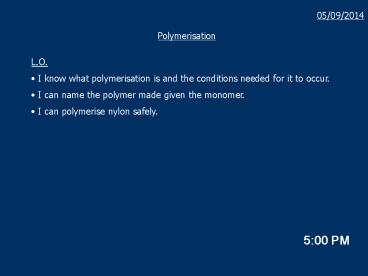Polymerisation PowerPoint PPT Presentation
1 / 18
Title: Polymerisation
1
05/09/2014
Polymerisation
- L.O.
- I know what polymerisation is and the conditions
needed for it to occur. - I can name the polymer made given the monomer.
- I can polymerise nylon safely.
500 PM
2
What things would be made from plastics nowadays?
500 PM
3
Making Plastics
Whenever oil companies _______ large molecules
into smaller ones, _______ is made. Ethene is a
very useful little molecule. It is the _______
material for many plastics. Plastics were first
made on a ______ scale in the 1930s. Plastics
are _____ molecules. They are usually long chains
made from __________ of atoms. These long chain
molecules are called _________.(Poly- meaning
many e.g. a polygon is a many sided shape)
crack
ethene
starting
large
huge
thousands
polymers
500 PM
4
Making Plastics
Polymers are made from thousands of _______
reactive molecules called __________. (Mono-
meaming one e.g. a monorail is a railway with
only one track.) The reaction is called
_____________.
small
monomers
polymerisation
HIGH PRESSURE lots
of monomers polymer
CATALYST
500 PM
5
Poly(e)thene
- One important reaction of alkenes involves the
joining together of alkene molecules.
And lots more..
Lots of ethene molecules 1
2 3 4
5 thousands
This is called addition polymerisation and is
written as
Pressure catalyst
n
n
ethene
poly(e)thene
6
- The monomer propene can also be
- polymerised to produce polypropene.
n
n
propene
Poly(propene)
7
- Tetrafluoroethene is another alkene that is made
into an important plastic used to coat non-stick
pans polytetrafluoroethane or PTFE.
n
n
Poly(tetrafluoroethane) or PTFE
tetrafluoroethene
8
Activity
- Fill in the products that will be obtained from
vinyl chloride
H
Cl
H
Cl
C
C
C
C
H
H
H
H
n
pvc
polyvinylchloride
9
Activity
- Fill in the monomer that produced polystyrene and
name the monomer.
C C styrene
H
H
H
H
C C C C C C
H
H
H
H
H
H
H
H
n
polystyrene
10
Making Nylon Condensation Polymerisation
Small quantities of monomer A and monomer B were
carefully poured into a beaker. The polymer
Nylon was formed at the interface of the 2
monomers.
11
Across Down
3) separate substances with different boiling points 1) Contain a double bond
7) saturated hydrocarbon 2) A polymer made from the monomer ester
8) joining of many small molecules 4) breaking up a large molecules
9) full up unable to add more atoms 5) the different substances collected from distillation
6) used to test for unsaturated molecules.
A
T
U
R
A
T
E
D
12
- Which of these is an alkane?
- C6H14
- C4H8
- C102H204
13
- Which of these is a true statement about
- alkenes?
- A. They turn bromine water from colourless to
red - B. They contain a double bond
- C. The smallest alkene has 1 carbon atom
14
- Which of these is a true statement about
cracking? - A. it is the separation of molecules into
fractions of different sizes. - B. it produces polymers
- C. it uses a catalyst.
15
- Which of these is a true statement about
polymerisation? - it is the joining together of many small
molecules. - it is the thermal decomposition of plastics
- it is carried out using saturated molecules
16
- Which of these is an addition polymer?
- A. styrene
- B. ethene
- C. p.v.c.
17
- How might you test to see if polystyrene still
- contained some unsaturated monomer (styrene)?
- A. Crush it up and burn it.
- B. Crush it up and add it to bromine water
- C. Crush it up and add hydrochloric acid
18
Bingo!!
- alkane 9. catalyst
- alkene 10. heat
- covalent 11. hydrocarbon
- petrol 12. crude oil
- cracking 13. ethene
- useful 14. butane
- carbon 15. octane
- hydrogen 16. double

